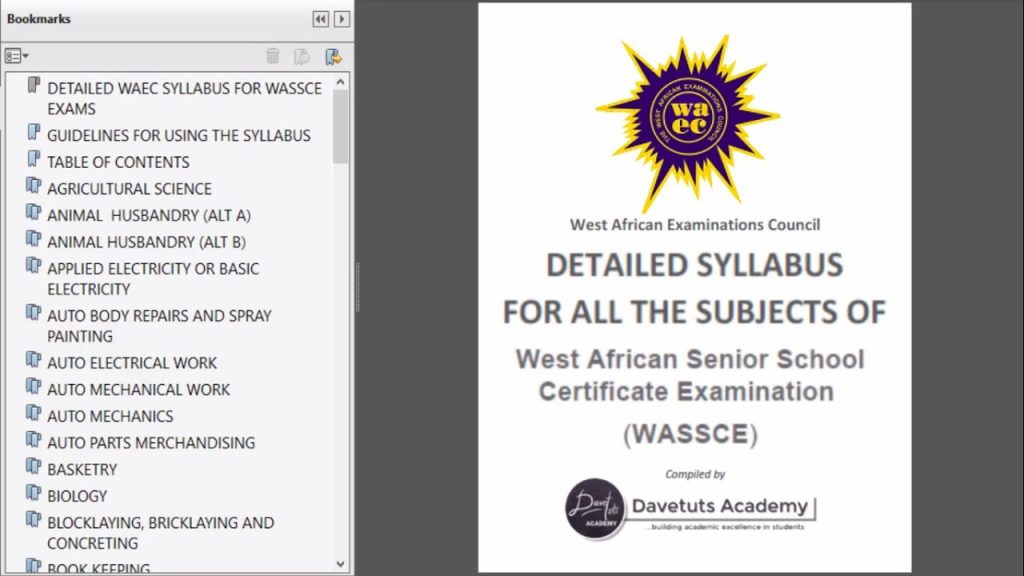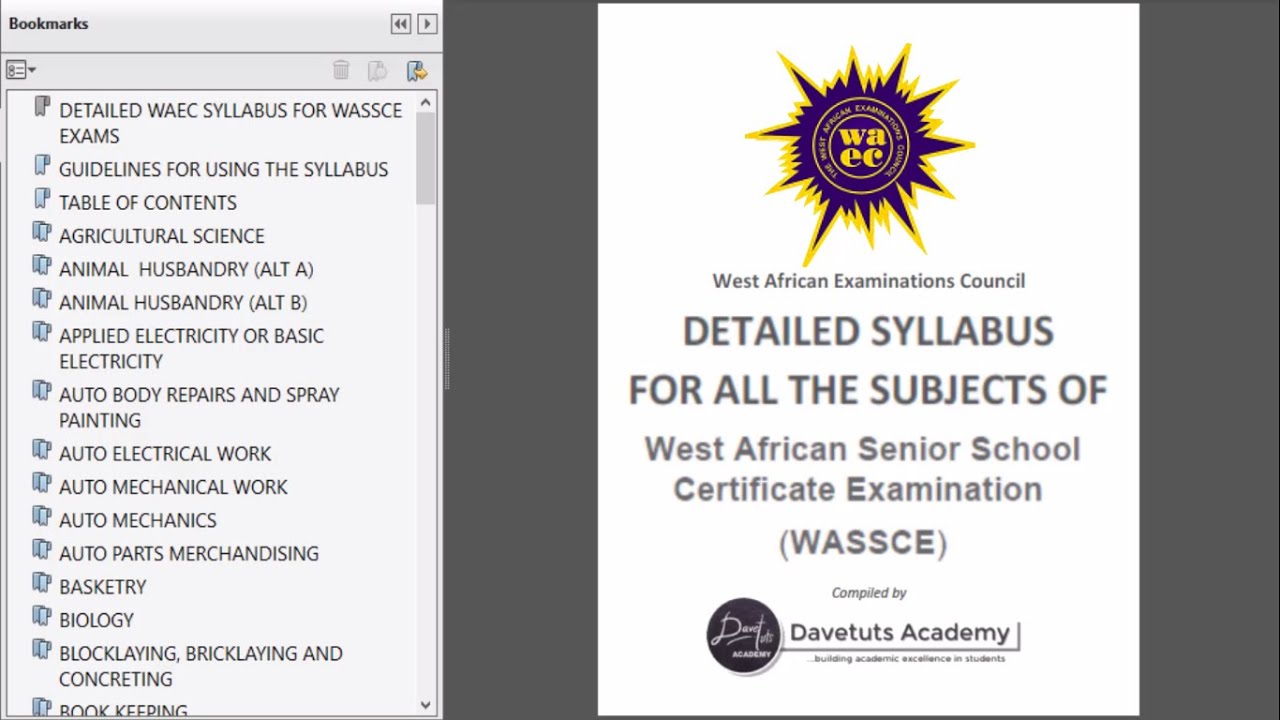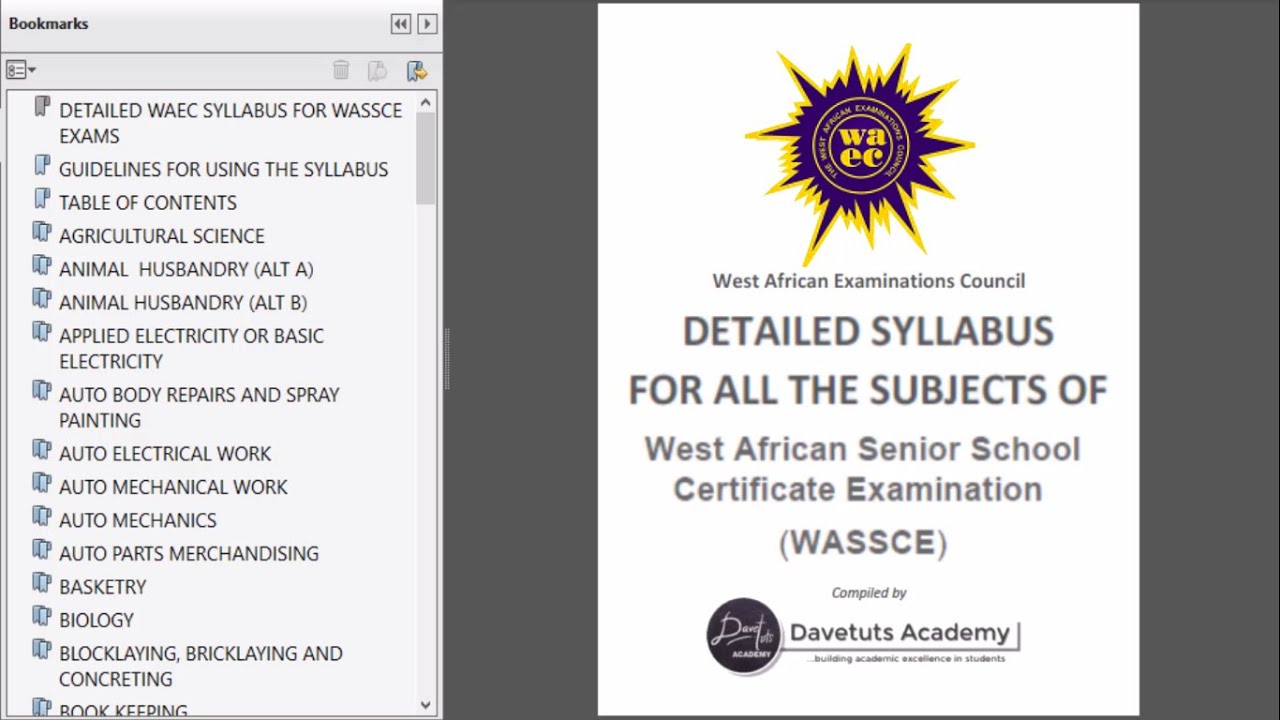WAEC SYLLABUS FOR Christian Religious Studies 2024/2025
Are you preparing for the West African Examinations Council (WAEC) exams in 2024/2025? Do you want to ace the Christian Religious Studies (CRS) subject and impress your teachers and peers? If yes, then you are in the right place. In this blog post, we will provide you with everything you need to know about the WAEC syllabus for Christian Religious Studies 2024/2025. We will cover the following topics:

- The aim and objectives of WAEC CRS syllabus
- The list of topics in the WAEC syllabus for Christian Religious Studies
- The study resources and tips for WAEC CRS syllabus
- The conclusion and summary of WAEC CRS syllabus
- The frequently asked questions and answers about WAEC CRS syllabus
By the end of this blog post, you will have a clear understanding of the WAEC syllabus for Christian Religious Studies 2024/2025 and how to prepare for it effectively. So, let’s get started!
The Aim and Objectives of WAEC CRS Syllabus
The WAEC syllabus for Christian Religious Studies is designed to help students achieve the following aims and objectives:
- To have knowledge, understanding and appreciation of the religious, cultural, historical and social background of the biblical materials prescribed to be studied
- To develop critical and analytical skills in interpreting and applying the biblical texts to contemporary issues and situations
- To foster moral and spiritual values and attitudes that are consistent with the Christian faith and practice
- To promote inter-religious dialogue and harmony among people of different faiths and cultures
The WAEC syllabus for Christian Religious Studies is divided into three sections: Old Testament Studies, New Testament Studies, and Comparative Studies. Each section has its own sub-topics and themes that students are expected to cover in depth.
The List of Topics in the WAEC Syllabus for Christian Religious Studies
The WAEC syllabus for Christian Religious Studies 2024/2025 covers the following topics and sub-topics:
Section A: Old Testament Studies
- The Creation Story: This section explores the biblical account of creation, highlighting key elements and theological implications.
- The Patriarchs: Students will delve into the lives of notable figures like Abraham, Isaac, and Jacob, understanding their significance in the Old Testament.
- The Exodus and the Law: An examination of the Israelites’ journey from Egypt, the Ten Commandments, and the covenant between God and Israel.
- The Prophets: Comprehensive coverage of major prophets like Isaiah, Jeremiah, and Ezekiel, emphasizing their messages and historical context.
Section B: New Testament Studies
- The Life of Jesus Christ: A detailed study of the life, teachings, and ministry of Jesus, including his parables and miracles.
- The Early Church: Exploring the growth and development of the Christian church in its formative years.
- The Letters and Epistles: An analysis of the writings of Paul, Peter, and other apostles, addressing doctrinal issues and practical Christian living.
- The Book of Revelation: A fascinating look into apocalyptic literature and its relevance in Christian theology.
Section C: Comparative Studies
- The Relationship between Christianity and Other Religions: A comparative study of the similarities and differences between Christianity and other major world religions, such as Islam, Judaism, Hinduism, and Buddhism.
- The Impact of Christianity on African Culture and Society: A critical evaluation of the positive and negative effects of Christianity on various aspects of African culture and society, such as art, music, education, politics, and ethics.
The Study Resources and Tips for WAEC CRS Syllabus
To prepare well for the WAEC syllabus for Christian Religious Studies 2024/2025, students need to have access to the following study resources and tips:
- The Bible: The primary and most important source of information for the WAEC syllabus for Christian Religious Studies is the Bible. Students should read and study the relevant passages from both the Old and New Testaments, using different versions and translations for better understanding and comparison.
- The WAEC Past Questions and Answers: The WAEC past questions and answers are very helpful in familiarizing students with the format and style of the WAEC exams. Students should practice answering the past questions and check their answers with the marking schemes provided by WAEC.
- The WAEC Recommended Textbooks: The WAEC recommended textbooks are supplementary materials that provide additional insights and explanations on the topics covered by the WAEC syllabus for Christian Religious Studies. Students should consult these textbooks for further reading and research on the biblical themes and issues.
- The Online Resources: The online resources are useful tools that offer access to various websites, blogs, podcasts, videos, and articles that are related to the WAEC syllabus for Christian Religious Studies. Students should use these resources to enhance their knowledge and understanding of the subject matter and to keep abreast of the latest developments and trends in the field of Christian Religious Studies.
Some of the online resources that students can use are:
- WAEC 2024/2025 Syllabus for Christian Religious Studies: This is a comprehensive guide that provides a detailed outline of the curriculum, key topics, and recommended study materials for the WAEC syllabus for Christian Religious Studies 2024/2025.
- WAEC Syllabus for Christian Religious Studies (CRS) 2024/2025: This is a concise summary that highlights the aims and objectives, notes and format for the WAEC syllabus for Christian Religious Studies 2024/2025.
- CHRISTIAN RELIGIOUS STUDIES Waec Syllabus 2024: This is a simple overview that lists the main topics and sub-topics in the WAEC syllabus for Christian Religious Studies 2024/2025.
The Conclusion and Summary of WAEC CRS Syllabus
In conclusion, the WAEC syllabus for Christian Religious Studies 2024/2025 is a comprehensive and rigorous curriculum that covers a wide range of topics and themes in the field of Christian Religious Studies. It aims to equip students with the knowledge, skills, and values that are essential for their academic and personal development. To succeed in the WAEC exams, students need to study the syllabus thoroughly and use the available study resources and tips effectively.
Here is a summary of the main points of this blog post:
- The WAEC syllabus for Christian Religious Studies 2024/2025 has three sections: Old Testament Studies, New Testament Studies, and Comparative Studies.
- The WAEC syllabus for Christian Religious Studies 2024/2025 has various aims and objectives, such as developing critical and analytical skills, fostering moral and spiritual values, and promoting inter-religious dialogue and harmony.
- The WAEC syllabus for Christian Religious Studies 2024/2025 requires students to use the Bible, the WAEC past questions and answers, the WAEC recommended textbooks, and the online resources as study materials and tools.
- The WAEC syllabus for Christian Religious Studies 2024/2025 is a challenging and rewarding subject that prepares students for the WAEC exams and beyond.
The Frequently Asked Questions and Answers about WAEC CRS Syllabus
Here are some of the frequently asked questions and answers about the WAEC syllabus for Christian Religious Studies 2024/2025:
- Q: How many questions are there in the WAEC CRS exam?
- A: The WAEC CRS exam consists of two papers: Paper 1 and Paper 2. Paper 1 is a multiple-choice paper that contains 50 questions and lasts for 50 minutes. Paper 2 is an essay paper that contains 10 questions and lasts for 2 hours. Students are required to answer five questions from Paper 2, choosing at least one question from each section.
- Q: How is the WAEC CRS exam graded?
- A: The WAEC CRS exam is graded according to the WAEC grading system, which uses letters and percentages to indicate the level of performance. The grading system is as follows:
| Letter Grade | Percentage Score | Remark | | A1 | 75% – 100% | Excellent | | B2 | 70% – 74% | Very good | | B3 | 65% – 69% | Good | | C4 | 60% – 64% | Credit | | C5 | 55% – 59% | Credit | | C6 | 50% – 54% | Credit | | D7 | 45% – 49% | Pass | | E8 | 40% – 44% | Pass | | F9 | 0% – 39% | Fail |
- Q: What are the benefits of studying the WAEC syllabus for Christian Religious Studies 2024/2025?
- A: Studying the WAEC syllabus for Christian Religious Studies 2024/2025 has many benefits, such as:
- It helps students to improve their knowledge and understanding of the Christian faith and practice
- It helps students to develop their critical and analytical skills in interpreting and applying the biblical texts to contemporary issues and situations
- It helps students to foster moral and spiritual values and attitudes that are consistent with the Christian faith and practice
- It helps students to promote inter-religious dialogue and harmony among people of different faiths and cultures
- It helps students to prepare for the WAEC

